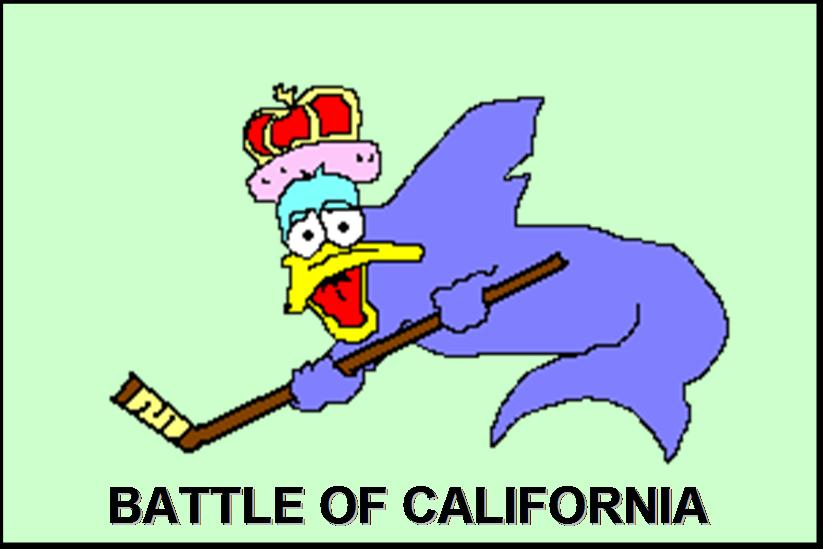In Defense of Tanking
Michael Farber had a weird blurb in his article at SI.com today:
Meanwhile, an astute NHL observer of my acquaintance, a man young enough to stay up until the end of West Coast games, tells me that he heard a color commentator get apoplectic when Los Angeles Kings coach Marc Crawford had the temerity to pull his goaltender in an attempt to score a late, tying goal. According to our spy, the commentator sputtered that the woeful Kings should be trying to get a better draft position, not a point by forcing overtime.
In other words, the Kings should not have been trying to win. To use a word kicked around in the NBA this week by Minnesota Timberwolves owner Glen Taylor in connection with the estimable Kevin Garnett, they should be in the "tank."
What? I'm assuming he's talking about the game against San Jose last Tuesday. I know Jimmy didn't say that, so I'm assuming it was probably Drew Remenda saying that. I'm also assuming he was kidding, since he's Drew Remenda. If anything, wasn't it probably more a dig at how the Kings suck than anything else?
And I think we need to make a distinction between good tanking and bad tanking. Things like bringing up young players to get a look at them and putting players in unfamiliar roles (like Tom Preissing on the penalty kill) are examples of good tanking in my opinion because you're trying to make your team better in the future. Things like playing one goaltender over another or having your best players come down with "injuries" are examples of bad tanking because those don't really help your team short-term or long-term. Things like not pulling your goalie when you're down by 1 is ridiculous and no one would ever actually do that.
So far, the Kings have stayed on the good side of tanking, although that Labarbera injury seems fishy to me. Sure, we could be more competitive if Brian Boyle and Ted Purcell were up with the big club, but Dean Lombardi has made the argument that it's better for their development to lead Manchester to the playoffs and I agree with him. Are we going to force teams to possibly hinder a prospect's development just to make ourselves feel better about the competitiveness of the league? The NHL has already done some things to ensure tanking doesn't get out of hand (Draft Lottery); anything else is interfering with the business of running a club.
And I agree with Farber to a point about fans who cheer for their team to lose. Yeah, guys who get upset when the Kings win because it diminishes our chances to get Stamkos are douche bags, but their heart is in the right place. They're obviously upset their team is terrible and are dealing with it in their own way. Getting mad at them is like getting mad at someone for throwing their gear after losing a hockey game. I could never want the Kings to lose because my mood is too dependant on if they win or not. (That's not very good either.) If they do lose, though, I don't get too upset because I know rationally that the Kings as an organization can only benefit from it. The fan is going to be there long after these current players move on to another organization. They're allowed to look past any one season.
Update: Here's a hilarious anecdote from an NHL.com article about Jack Johnson and his relationship with Sidney Crosby:
Baseball was a horse of a different color, although Johnson was just as protective of Crosby on the diamond as he was on the ice. There was one game they were playing for Shattuck-Saint Mary’s when an opposing pitcher brushed Crosby back. Johnson didn’t appreciate it.“We were playing baseball together, and some pitcher threw pretty high on him,” Johnson said, fighting back laughter. “It almost hit him in the head. I got up to bat, and the first pitch came and I just dropped my bat and charged the mound and went after the pitcher. I didn’t play in any more baseball games that year.”
Hockey players are fucking crazy.









5 comments:
Jeez, nobody's commented on this?
I guess implicitly this means we all agree, no-questions-asked. Good tanking, Kings.
I choose to believe that I have effectively ended the debate on this subject and that's why no one bothered to reply.
I would admire baseball's code of honour (regarding beanball) more if their bench-clearing brawls weren't the gayest-looking fights I've seen outside a basketball court.
An old teammate of mine was telling me that he just started playing in a rec. basketball league and he's almost gotten into 2 fights because the other team says he's playing too rough. He doesn't know what's going on; he said, "I mean, if I'm running for the ball and some guy runs into me, that's not my fault!" Hockey just takes a different mindset, I guess.
That's just it. I mean, contact happens in most sports, or at least it does if you try. The difference is whether you get all butthurt over it, or whether you play through it like a man. On the one end of the scale, you have the likes of rugby, North American football, and hockey, which not only fail to discourage interplayer contact, but encourage it as a core element of gameplay. On the other, you have soccer, which has some of the most attrocious examples of limpdickery I've ever seen. Surely in baseball, a game where you're "tagged" out, a little incidental contact is inherently understood, though certainly not encouraged.
Post a Comment